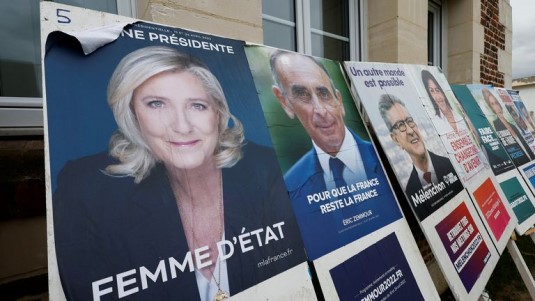The Warning from France

We await more crunching and the outcomes of the count, but there is something very concerning about the numbers supporting Le Pen. When it comes to the voting habits of working age people and the young, they're at cross purposes with nearly everywhere else in Europe. According to YouGov numbers, the younger one is the greater the propensity to vote for Le Pen. They suggest the over 55s would support Macron 55%-45%. This is the only age cohort that shows a majority for the centrist candidate over the far right. Moving down the age ranges, it's 51%-49% for Le Pen in the 45s-54s, 53%-47% in the 25s-44s, and the 18s to 24s? 56%-44%. Is it really the case the younger one is, the more fascist-adjacent they are?
This data poses the theory often pushed here a challenge. That is the structural transformations of the character of work in advanced capitalist societies are seeing it configured around immaterial labour: the replacement of material production increasingly by service provision, knowledge, and care. The consequences of this are new patterns of exploitation, new precarities, and a multiplication of identity politics. But it also propagates a new common sense: social liberalism. Less an ideology and more a diffuse common sense, it is a decisive shift in popular attitudes and values that reflects the greater stress on sociality demanded by capital of labour power in the 21st century. Everyday spontaneous anti-racism, anti-sexism, anti-LGBTQ bigotry, and low-level internationalism are rooted in tolerance and the ability to get along. This stands in marked contrast to older layers, and particularly the retired, whose social conservatism (which is not unrelated to their relationship to property) sits awkwardly at odds with the attitudes of their children and grandchildren. Therefore, assuming values are the primary driver of voter behaviour, social conservatives vote right for conservatives. And social liberals vote liberal or left. Hence in the United States, the young being the dynamo of the Bernie Sanders campaign. Here in the UK, their powering of Corbynism and, if the polls are to be believed, disproportionate backing for Keir Starmer's Labour. And in Germany, the good showing for the Free Democrats and the Greens in the last election. Why then is France the outlier?
In 2017, Melanchon was the lead candidate among 18-24s, while Le Pen came second. But according to YouGov's numbers the leader among the young going into this election was the even-more-racist Nigel Farage equivalent, Éric Zemmour. This might have been cancelled out by the late surge for the left in recent days, but combined with Le Pen's support we're looking at 49% of France's most socially liberal generation willing to support a far right candidate. How can this be?
It's the interests, stupid.
When Macron was elected in 2017, his "liberal" administration was all set to repeat the mistakes of his predecessors in the Socialist Party. Who, incidentally, have gone from holding the presidency five years ago to winning a projected two per cent today. For his pains, Macron has presided over France's persistent youth unemployment problem. Even with a plan to massage the figures by giving youngsters €500/month for completing a series of training courses, it jumped from 14.8.% to 16.4% between January and April this year. He has also tightened the conditionalities on unemployment support, disproportionately impacting the young, and, like here, the cost of living is outstripping wage rises. Similarly, while not at UK-levels house price inflation is rising faster than pay, and Macron pushed through pension reforms that will lead to lower incomes for workers in retirement. Other factors include high-handed, authoritarian government, a retrenchment of the over-centralised French state at the expense of the regions, and poor public road infrastructure have played their parts. Many of France's problems precede Macron, but has hasn't done much about them.
And there is the disastrous re-election campaign. Macron thought now would be a good time to affect elite disinterestedness. He announced his campaign late, refused to debate other candidates, and has kept away from meeting the public. Contrast this with Le Pen who's not only done her woman-of-the-people shtick, but has made cost-of-living issues the centrepiece of her campaign. For many people of working age and particularly the young, the final round choice will be between a candidate offering more of the same and another talking about jobs, wages, housing, and prices. People prepared to support Le Pen over Macron, including Melanchon supporters, are making a rational choice calculation. She might be authoritarian, racist, and wants to go out her way to bash Muslims. But then, for all his Blair-lite impostures about social justice and "radicalism", Macron appears to be little different. Political science isn't rocket science. If politicians speak to popular interests, they will attract support from across the spectrum. Especially when up against a cloth-eared incumbent.
France therefore is a warning. Macron is going to have a great deal of difficulty converting younger voters in the second round because of his record. It's not enough to expect voters to follow Melanchon's advice and not transfer their support to Le Pen, he's got to offer something by making the left a comprehensive offer. It might work and keep him in office. But it's a reminder for us too. Values broadly align with politics, but when a formally socially liberal government reneges on its values and puts capital before labour, voters who, on paper, should be their supporters will gravitate to parties and candidates who offer them something. As France is demonstrating, arguing Le Pen is beyond the pail is very definitely not enough - especially while you're kicking those whose votes you want in the teeth.
Image Credit